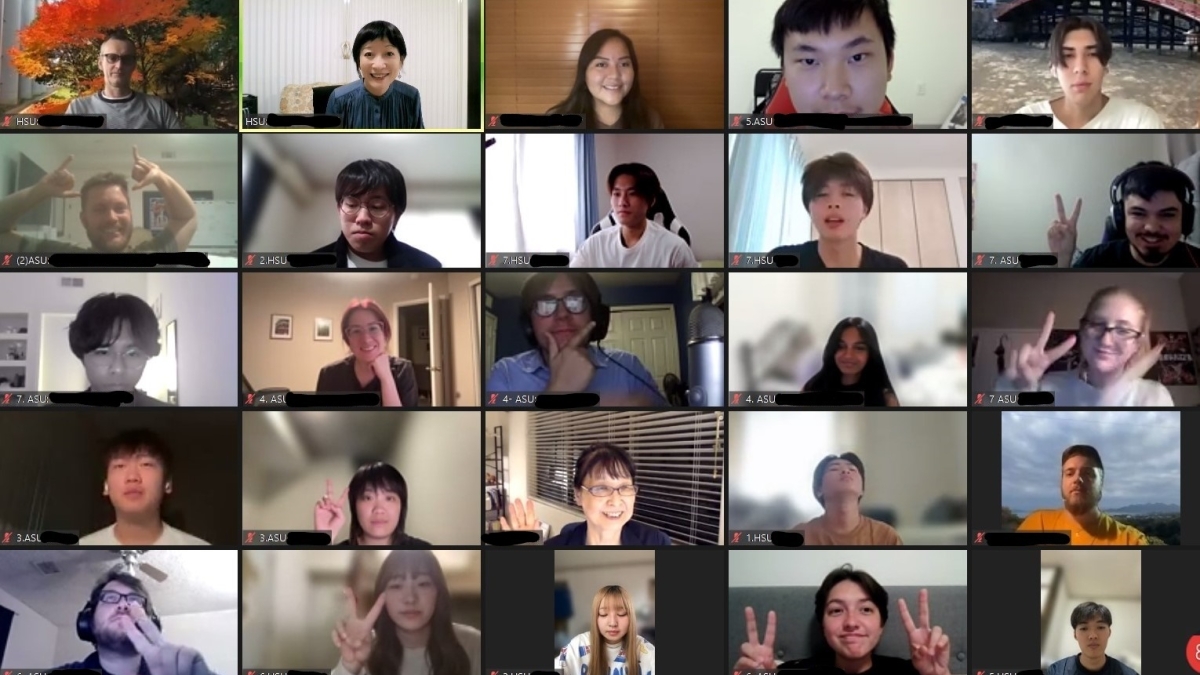Online program provides intercultural experience for ASU, Japanese students

Students from ASU and Hiroshima Shudo University come together in online discussions via Zoom as part of the Collaborative Online International Learning, or COIL, program. Courtesy photo
Japanese instructor Hiroko Hino of Arizona State University's School of International Letters and Cultures takes an innovative approach when teaching her students a new language.
Her classThe course is JPN 309: Japanese Oral Communication I and prerequisites include JPN 202 or 210 with a C or better. es immerse students in Japanese language and culture right from Durham Hall where students from ASU and Hiroshima Shudo University pair up in small groups to engage in online discussions via Zoom.
The goal for ASU students participating in the Collaborative Online International Learning, or COIL, program is to improve their Japanese fluency and communication skills. For the students in Hiroshima, it is a chance for freshmen to interact with international students, as most of them have never been to the United States or communicated with foreigners before.
The class is a unique opportunity for ASU students to be able to ask questions about Japanese cultures, gain more cultural awareness, and acknowledge both the similarities and differences between Japan and the United States.
Hino said she's seen improvement in language retention for the students that have used the COIL program.
“It was a really fantastic program not only for me, but also the students, so they could feel that they improved themselves. It’s great,” Hino said.
At the beginning of the semester, Hino will check to see where each student is at in their proficiency, and then at the end of the semester, she will do an interview with them to gauge just how much they have improved.
“Some students are so reluctant to talk in Japanese in the beginning of the semester, but in the last interview session, they talked so fluently without any pause,” she said.
COIL meetings also provide ASU students with the perspective to see and understand areas of everyday life through the eyes of their HSU counterparts.
For example, since recycling is very important in Japan, meetings would focus on various environmental topics, such as recycling and the importance of sustainable development.
More specifically, students discussed the 17 Sustainable Development Goals, or SDGs, from the United Nations webpage and how things can improve for the future.
At the end of the semester, students create a presentation based on what environmental solutions they came up with from their discussions with HSU students.
ASU student Dallin Richardson, who previously took the class, said he enjoyed collaborating with Japanese students on their final project instead of doing it alone. He said he appreciated being in the COIL program because he got the chance to virtually reunite with the same students and professors that he saw when he was studying abroad at Hiroshima Shudo University before taking the class.
Richardson also emphasized the benefits of being put into an environment with students who don’t have the same native language.
“Another reason it helps to build Japanese skills is that we had to research and speak about challenging topics that don’t usually come up in normal conversations — in our case, this was about environmental projects and Sustainable Development Goals in Japan and the United States,” he said.
More Arts, humanities and education

ASU professor, alum named Yamaha '40 Under 40' outstanding music educators
A music career conference that connects college students with such industry leaders as Timbaland. A K–12 program that incorporates technology into music so that students are using digital tools to…

ASU's Poitier Film School to host master classes, screening series with visionary filmmakers
Rodrigo Reyes, the acclaimed Mexican American filmmaker and Guggenheim Fellow whose 2022 documentary “Sansón and Me” won the Best Film Award at Sheffield DocFest, has built his career with films that…

Pen Project helps unlock writing talent for incarcerated writers
It’s a typical Monday afternoon and Lance Graham is on his way to the Arizona State Prison in Goodyear.It’s a familiar scene. Graham has been in prison before.“I feel comfortable in prison because of…

